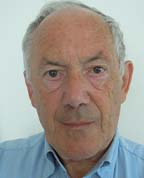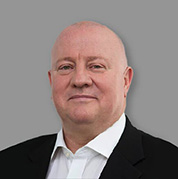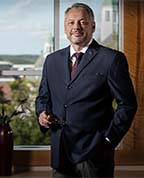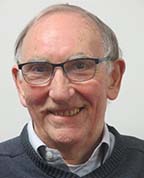Alumni profiles
Highlighting alumni stories and successes in the form of alumni profiles enables us to celebrate the diverse range of areas in which our alumni have gained success, both in terms of their chosen careers and their personal achievements.
Take a look at some alumni profiles below.
Chemistry Alumni profiles
Professor Peter Atkins (Chemistry BSc, 1961; Chemistry PhD 1964; Honorary Doctor of Science, 2002)
 What have you gone on to do since graduating from the University of Leicester?
What have you gone on to do since graduating from the University of Leicester?
Since graduating from The University of Leicester, although now retired, I have enjoyed a successful academic career, firstly a postdoc at UCLA, then full-time at Oxford from 1965 until 2007. Since 1975 I have mostly been writing books of various kinds and continue to do so during retirement. I have written over 70 books which range from textbooks to books conveying a scientific attitude to the general public.
As a prominent chemistry alumnus, what are the biggest challenges for the profession in the modern day?
I believe one of the biggest challenges for the profession today is the appreciation of its contributions.
Do you have a favourite memory of the chemistry department or your tutor from your time at The University of Leicester?
I am forever grateful to Dr Florence Shaw, who interviewed me (in 1958) and took the chance with a school drop-out. I am also equally grateful to my PhD supervisor, Professor Martyn Symons, who helped me in various ways.
What advice and tips do you have for students and recent graduates who would like to enter a similar work role to you?
Go for it!
Dr Philip Boon (Chemistry with Biochemistry BSc, 1980; Physical Chemistry PhD, 1985)
 What have you gone on to do since graduating from the University of Leicester?
What have you gone on to do since graduating from the University of Leicester?
I was appointed as Chief Operating Officer for Innospec Limited (Innospec Inc.), a $1.6 billion Nasdaq listed company, effective November 2015. In this role, I have direct responsibility for the global fuel specialties business as well as an overseeing role with our global performance chemicals and oilfield specialties businesses and have a key role in the strategic development of Innospec. Before this, I was the Executive Vice President of Business Operations from June 2009 and was responsible for all our businesses in Europe, the Middle East, and Africa (EMEA). When joining the Company in 1997, I held various senior management positions covering most operational aspects of the business and as a result have over 30 years of international experience in the speciality chemicals industry. My PhD in Chemistry from The University of Leicester, coupled with hard work, has enabled me to work in various organisations such as Ciba Geigy and FMC in the U.S. and Europe.
As a prominent chemistry alumnus, what are the biggest challenges for the profession in the modern day?
I believe today's most significant challenges in the profession include: sustainability, carbon neutrality, geopolitical instability and un-harmonised regulations.
Do you have a favourite memory of the chemistry department or your tutor from your time at The University of Leicester?
I loved the social aspect of the department. I vividly remember getting destroyed by Paul Cullis at squash, even though he was a big guy, he could quickly move around that court! Also, I loved playing 5-a-side football with great players in the post-grad chemist’s team.
What advice and tips do you have for students and recent graduates who would like to enter a similar work role as you?
Do something you love or at least enjoy most of the time. If you want to get to the top, be prepared to make sacrifices, work really hard and be ready to take on opportunities when they come, live abroad if necessary and have a lot of determination.
Dr Paul Brown (Chemistry BSc, 1981; Chemistry PhD, 1985)
 What have you gone on to do since graduating from the University of Leicester?
What have you gone on to do since graduating from the University of Leicester?
Following six formative years at the Department of Chemistry in Leicester, I started a post-doctorate position at the California Institute of Technology (Caltech), California. I returned to the UK in 1986 to join the Pharmaceutical company Roche, based in Welwyn Garden City. Although I had never mapped out what I wanted my future to look like, this marked the start of a wonderful 35 year career that provided me with the opportunity to live and work in five different countries (UK, Switzerland, Canada, Sweden, US) and in both pharmaceuticals and latterly diagnostics. By the time I retired from my role as CEO of the Molecular Solutions organisation in 2020, I was responsible for an organisation of over 4000 talented people with an annual turnover of $5 billion. Since retiring in 2020, I have joined several start-up companies as a Director or Advisor with a view to 'giving back to science' by sharing my 35 years of experience.
How has The University of Leicester helped to shape you over the years?
Over the years, I have often reflected on how blessed I was to have studied chemistry at The University of Leicester. Having led large organisations for many years there is no doubt in my mind that a background in chemistry was, and continues to be, a gateway to using science for the benefit of mankind. Even with the explosive pace of scientific advances over the last decade, a knowledge of molecular interactions continues to be a key to unlocking the potential of science.
The time I spent as a PhD student of Paul Jenkins turned out to be foundational for my career, something for which I am eternally grateful and should have told him more often. Beyond Paul's scientific mentorship, his values and humanity were a lifelong lighthouse. Years later, as I started to lead large teams of people, I realised that I had also (subliminally) benefitted from the sense of community created by the academic staff in the Organic Chemistry Department. Paul Jenkins, Paul Cullis, Bob Atkinson, Martin Harger, John Malpass and Stuart Trippet helped create a diverse, inclusive environment. This sense of community and safe harbour was something that I tried to emulate in my own personal leadership journey over the last 35+ years.
Do you have a favourite memory of the chemistry department or your tutor from your time at The University of Leicester?
Like many alumni, I have many memories that I could share, but the experience below is one I will never forget. For the non-chemists reading this, please forgive the chemistry detour, which provides context. As Paul Jenkins' first PhD student, I was given the opportunity to work on the synthesis of taxane (or at least the fundamental core tricyclic ring structure). The central inventive step was to build a framework with a tethered diene and dienophile that would create the tricyclic ring structure via an intramolecular Diels-Alder reaction. After over two years, I finally got to the point of having the Diels-Alder precursor. I vividly remember telling Paul on a Friday evening that, at long last, we were ready. He was as excited as I was and clearly expected that I would go straight back to the lab and run the pivotal reaction. When I told him I was going to the pub and would get around to it on Monday, a look of dismay appeared on his face. However, to his credit, he kept his calm and said OK! The truth was that I wanted some breathing space to prepare myself before trying this make or break reaction. So Sunday morning, I went into the lab and ran the experiment. Within a few hours I knew that the reaction had worked. I ran the NMR and then drove down to Paul's house, knocked on his door and when he opened it, I just held up the NMR in front of him. I'll never forget the relief and joy on his face, not to mention his temporary loss of words!
What advice and tips do you have for students and recent graduates who would like to enter a similar work role to you?
For those that want a career in science, there's no better foundation than training in chemistry. However, that alone is just a starting point. If you commit to lifelong learning, both scientifically and as a leader, you can achieve things you never imagined.
Professor Andrew Hakin (Chemistry PhD, 1987)
 What have you gone on to do since graduating from the University of Leicester?
What have you gone on to do since graduating from the University of Leicester?
Following the completion of a BSc (Hons) Chemistry degree at the University of Leicester in 1984, I pursued a PhD in Chemistry (awarded in 1987) in the same department under the supervision of Dr Michael J. Blandamer. The research conducted in the preparation of my thesis, 'Kinetics of Aqueous Solutions', provided me with a deep understanding of chemical thermodynamics and, more specifically, the thermodynamics of aqueous solutions. In November of 1987, I married University of Leicester alumna Linda Cook (BA Economics and Economic History, 1985) and moved to Edmonton, Alberta, Canada where I commenced work at the University of Alberta as a post-doctoral fellow, under the supervision of Professor Loren G. Hepler. In the summer of 1989, I joined the University of Lethbridge (located in southern Alberta) as a tenure track Assistant Professor in the Department of Chemistry. I established a nationally-funded research program in the area of solution thermodynamics in which I specialized in the volumetric and thermochemical properties of aqueous systems. In 1994, I was awarded tenure and promoted to Associate Professor, and in 2000 I received the University of Lethbridge Distinguished Teacher Award. In 2003 I was promoted to the rank of Professor.
As a nationally funded researcher (Natural Sciences and Engineering Research Council of Canada), I was particularly interested in the techniques of calorimetry and densitometry and was successful in designing and building a densimeter (an instrument that measures the densities of fluids) that could operate with high precision at elevated temperatures and pressures. I used this instrument to look at the temperature and pressure dependencies of the volumetric properties of aqueous systems of biological importance. This included some of the first reported measurements for aqueous amino acid systems. My research program benefitted immeasurably from the contributions of the many undergraduate summer research assistants who worked in my laboratory, the graduate students I supervised, and the many research collaborators. In my years as an active researcher, I authored or co-authored 58 peer-reviewed journal articles as well as several book chapters, gave numerous conference presentations across the world, and in 2003 was honoured to receive the Stig Sunner Memorial Award. The International Calorimetry Conference awarded the latter in recognition of research and other contributions to the field of thermochemistry by an individual aged 40 or less.
I served as Chair of the Chemistry and Biochemistry Department at the University of Lethbridge for four years, beginning in 1999, on numerous university and faculty association committees, and became President of the University of Lethbridge Faculty Association in 2001. In 2005, I moved into university administration as the Associate Vice-President (Academic) before accepting an appointment as the University Provost and Vice-President (Academic) in 2007. There are many things I am proud of in my tenure as Provost and VPA, including the creation of a School of Liberal Education, progress with the indigenization of the university and the completion of a $280 million science building. In July 2020, after 31 years at the University of Lethbridge, I moved to Antigonish, Nova Scotia, in eastern Canada, to become the 19th President and Vice-Chancellor of St. Francis Xavier University.
As a prominent chemistry alumnus, what are the biggest challenges for the profession in the modern day?
The world of chemistry has experienced an explosion in the amount of new knowledge that is published and disseminated each year. Keeping up with what is known, and what can be trusted, has become highly challenging. Increasingly, some of the most interesting questions to be answered lie at the intersections of allied fields like biochemistry, physics, and mathematics. Therefore, to make progress in chemistry, it is highly advantageous to bring an understanding of such subjects to the table. In other words, the complexity of today's biggest questions requires analyses through many different lenses, and the strength of a researcher can often be measured in terms of the number of approaches and lenses they can focus on a problem. In this sense, the strength of a science education can be significantly enhanced by the many skills one can learn through exposure to a liberal education.
Good communication skills remain at a premium, as are abilities to translate the complexity of scientific outcomes and data into vocabulary and descriptions from which society can more easily benefit. The latter point, in my opinion, is of paramount importance to the future of science. There is no shortage of new knowledge, but knowledge translation needs to keep pace.
Do you have a favourite memory of the chemistry department or your tutor from your time at The University of Leicester?
Dr Michael J. Blandamer served as my Senior Undergraduate Project Supervisor, and the work that was conducted on that project led to my first co-authorship on a publication*. It was this work on the kinetics of reactions in microemulsion systems that gave me my first real taste of research in the area of physical chemistry, and encouraged me to pursue a SERC funded PhD under Professor Blandamer's supervision. Mike was a very generous man with an encyclopaedic knowledge of thermodynamics. He was always willing to share his thoughts and ideas. I have never met his equal in terms of his abilities to navigate the mathematically and equation structured world of thermodynamics, and it was his skill as a supervisor that put me on a path to a career in academia.
Mike's lab, which I shared with then PhD candidate Barbara Clark, was always a hive of activity in terms of projects to work on and ideas to consider. Proudly displayed on the wall of his lab were posters advertising the Calgary Stampede (an annual rodeo event held in Calgary, Alberta, Canada). Mike had spent time at the University of Calgary with Professor Ross Robertson and had developed a soft spot for the Alberta way of life. This must have rubbed off on me. Thanks to Mike, on the completion of my PhD I accepted a post-doctoral fellowship at the University of Alberta in Edmonton, Alberta, in the laboratory of Professor Loren G. Hepler. I will always be grateful to Mike for his mentorship and support, and for constantly demonstrating to me what it means to be a good colleague through the many collaborations he fostered. Mike made a huge difference to my life, for which I will always be grateful. I am proud of the 17 publications to which I made contributions as an undergraduate and as a PhD student under his supervision.
*Kinetics of Reaction between Hydroxide Ions and Iron (II) Complexes in Two Microemulsions - M.J. Blandamer, J. Burgess, B. Clark, A.W. Hakin, M.W. Hyett, S. Spencer, and N. Taylor, J. Chem. Soc., Faraday Trans. I, 2357-2363, 81, (1985).
What advice and tips do you have for students and recent graduates who would like to enter a similar work role to you?
Throughout my career as an academic, I have attempted to follow the path shown to me by those who had the most significant impact on my life; Professor Michael (Mike) Blandamer and Professor Loren Hepler. Be generous with your ideas and try to make a difference with all that you do. Treat everyone around you in the manner that you like to be treated, with kindness and respect and never forget to listen, as there will always be something to learn. In terms of advice to students, I would say get involved, get to know your professors and supervisors beyond the classroom experience and remember never to stop asking questions. Find the answers to good questions that help move all of us forward. Be inquisitive.
Professor Roger Sheldon (Chemistry PhD, 1967)
 What have you gone on to do since graduating from the University of Leicester?
What have you gone on to do since graduating from the University of Leicester?
After leaving Leicester with a PhD I moved to the US to complete a post-doctorate with Prof. Jay Kochi (1967-69). From there, I joined Shell Research in Amsterdam, where I was concerned with developing new, more environmentally friendly processes for bulk and fine chemicals using clean, catalytic technologies. I met my wife in Amsterdam and have lived in the Netherlands ever since. In 1980 I moved to DSM-Andeno as Research and Development Director, where I became involved in developing cleaner catalytic processes for the manufacture of pharma intermediates. In this period, I invented the E factor (kg waste per kg product) for measuring the waste produced in chemical manufacturing processes. The E factor was adopted by both industry and academia and I became known worldwide as Mr E factor. I also became interested in biocatalysis during this period and my interest in both chemo and biocatalysis continued and intensified when I moved to the Delft University of Technology (TUD) as a Professor of (Bio)catalysis and Organic Chemistry in 1990. Following my retirement from the TUD in 2007, I continued as CEO of CLEA Technologies. I then became a distinguished Professor of Biocatalysis Engineering at the University of the Witwatersrand in Johannesburg, South Africa in 2015.
For more details of my career and honours and awards received, see www.sheldon.nl.
As a prominent Chemistry Alumnus, what are the biggest challenges for the profession in the modern day?
I currently consider a few challenges for the profession: facilitating the ongoing transition to a climate-neutral, low-carbon energy base and a circular, waste-free bio-economy. Also, research at the cross-roads of chemistry, biology and medicine, for example, in developing treatments for a variety of disabling and life-threatening metabolic disorder diseases.
Do you have a favourite memory of the chemistry department or your tutor from your time at The University of Leicester?
I enjoyed my time at Leicester. I made a lot of friends (some of which I am still in contact with) and I learnt a lot from my co-supervisors, Professor Stuart Trippett and Professor Stephen Davidson.
What advice and tips do you have for students and recent graduates who would like to enter a similar work role to you?
Pick a subject that is interesting and important from both a societal and scientific viewpoint and go for it.